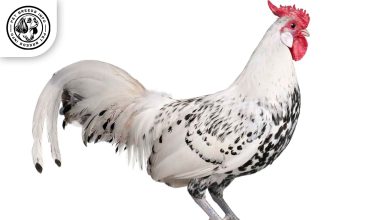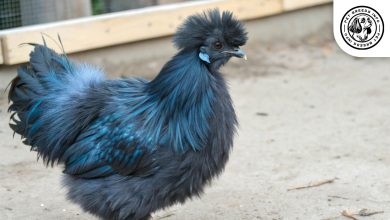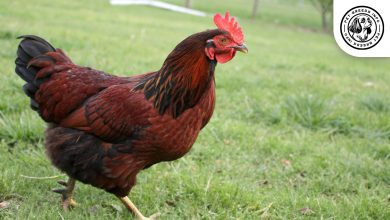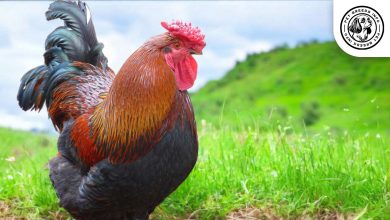Dorking Chicken Breed: Personality, Lifespan, Food & Care
General Introduction of the Breed
The Dorking Chicken is an ancient and highly esteemed breed, known in English as “Dorking Chicken” and often simply referred to as “Dorking.” This historic breed originated in England, specifically in the town of Dorking in Surrey. It is believed to have Roman origins, introduced to Britain by the Romans over 2,000 years ago. The breed was further refined in England, becoming a prized poultry breed for its high-quality meat and unique physical characteristics.
Table of Contents
| Common Name | Dorking Chicken |
| Scientific Name | Gallus gallus domesticus |
| Origin | England (with Roman roots) |
| Size | Medium to large – Males: 8–10 lbs, Females: 6–8 lbs |
| Lifespan | 6–8 years |
| Colors | White, Silver Gray, Red, Cuckoo, Dark |
| Talking Ability | None (not a talking bird) |
| Noise Level | Low – calm and peaceful |
| Social Behavior | Gentle, sociable, great with humans and mixed flocks |
Physical Characteristics
The Dorking Chicken is a medium to large-sized breed with a distinctive rectangular body shape. Males typically weigh between 8 to 10 pounds (3.6 to 4.5 kg), while females average 6 to 8 pounds (2.7 to 3.6 kg).
They have a single or rose comb, depending on the variety. Their plumage comes in various colors, including White, Silver Gray, Red, Cuckoo, and Dark.
Dorking Chickens have relatively short legs, distinguishing them from many other breeds. One unique trait is their five toes instead of the usual four seen in most chicken breeds. Their eyes are usually red or reddish-bay in color.
Their tail is medium-sized and well-proportioned to their body.

Personality and Temperament
The Dorking Chicken is known for its calm, friendly, and docile personality. They are intelligent birds that adapt well to human interaction and respond well to training.
They have a moderate energy level and enjoy foraging, making them good free-range birds. They are excellent companions for poultry keepers looking for a peaceful flock member.
They are highly social, both with humans and other chickens. Their gentle nature makes them great for families, children, and even mixed poultry flocks.
Dorking hens are known for their motherly instincts and make excellent broody mothers, often raising their chicks with care.
Care and Maintenance Requirements
Dorking Chickens require moderate levels of exercise and benefit greatly from free-ranging. However, they also adapt well to a large enclosed space.
Since they prefer pasture and open spaces for foraging, they are better suited for farms and backyards rather than small urban coops.
Their grooming needs are minimal. Regular inspections for external parasites like mites and lice are advisable, since their dense plumage can hide infestations.
They are relatively hardy birds but can be sensitive to extreme cold due to their large combs, which are prone to frostbite. Offering shade and fresh water in hot climates is also essential.
Read More: Orpington Chicken
Routine care such as nail trimming, beak observation, and occasional dust baths will help maintain their health and hygiene.

Diet and Nutrition
Dorking Chickens thrive on a balanced diet consisting primarily of high-quality poultry feed supplemented with grains, greens, and proteins.
They benefit from added calcium (such as crushed oyster shells) for stronger egg production in hens.
They should avoid processed foods, chocolate, caffeine, and avocado, all of which are toxic to chickens.
Fresh water should always be available, and they should be fed at least twice a day with enough nutrients to maintain their size and activity levels.
Health and Common Medical Issues
Dorking Chickens are generally healthy, but they are prone to common poultry ailments such as respiratory infections, mites, and lice.
Their large single comb variety can be susceptible to frostbite in cold climates.
With proper care, nutrition, and shelter, they have an average lifespan of 6 to 8 years.
Regular vaccinations, deworming, and routine vet check-ups are recommended to prevent diseases.
Read More: Palm Cockatoo Bird
Training and Behavior Management
Dorking Chickens are relatively easy to train, as they are intelligent and responsive to routine.
They can be taught to follow schedules for feeding and roosting.
Early socialization ensures they remain friendly and comfortable around humans and other animals.
Since they are docile, they rarely exhibit aggressive behaviors, making discipline minimal.
Interaction with Other Animals and Humans
Dorking Chickens are excellent with children due to their gentle and friendly temperament.
They get along well with other poultry breeds, making them great additions to mixed flocks.
They are ideal for families, small farms, and poultry enthusiasts who want a calm and easy-to-manage breed.
They are highly bonded to their owners and enjoy human interaction, making them more personable compared to some other chicken breeds.

Price and Availability
The cost of a Dorking Chicken varies depending on location, breeder reputation, and color variety. Generally, chicks cost around $5 to $15, while mature birds can range from $20 to $50.
When purchasing Dorking Chickens, it is important to buy from reputable breeders or hatcheries to ensure healthy genetics.
The breed is slightly less common than other poultry breeds, so ordering from specialized heritage breeders or poultry farms may be necessary.
Conclusion and Final Thoughts
The Dorking Chicken is an excellent choice for both beginner and experienced poultry keepers. Its friendly personality, superb meat quality, and historical significance make it a unique and valuable breed.
Read More: Cochin Chicken
They thrive best in backyard setups with space to forage, though they can adapt to confinement if necessary.
Potential owners should consider the breed’s need for protection from extreme weather and predators, as well as routine health maintenance.
Overall, the Dorking Chicken is an exceptional heritage breed that offers both utility and companionship, making it a great addition to any small farm or homestead.
FAQ
What makes the Dorking Chicken unique?
It has five toes instead of four, a rectangular body shape, and a history tracing back to Roman times.
Are Dorkings suitable for families?
Yes, their friendly temperament makes them ideal for families and children.
Can Dorking Chickens live in small coops?
While they can adapt to confinement, they do best in spacious areas where they can forage.
How well do Dorkings tolerate weather changes?
They’re hardy but sensitive to frost due to large combs and need shade in hot weather.
Do they get along with other chickens?
Absolutely. Their docile nature allows them to integrate well in mixed flocks.





